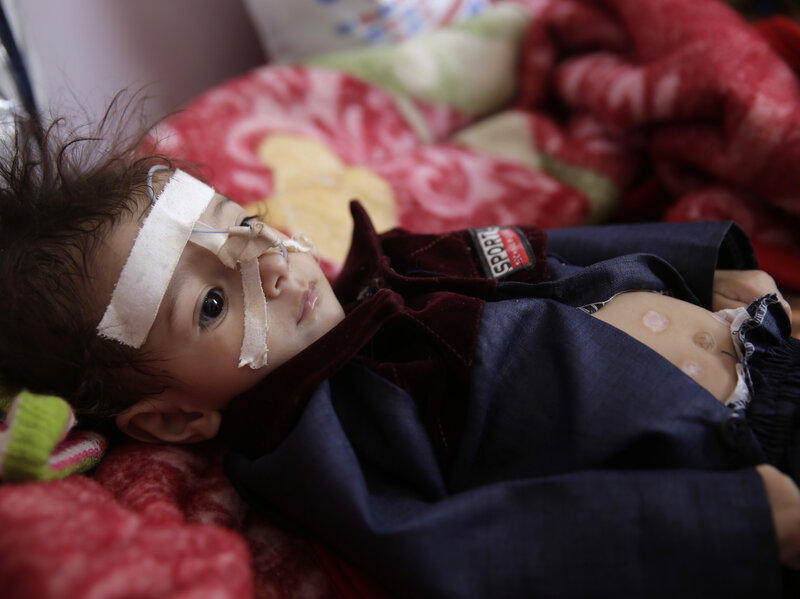Biden Administration Ends U.S. Support of Saudi-Led Offensive in Yemen
MIDDLE EAST AND NORTH AFRICA, 8 Feb 2021
Mark Katkov | NPR - TRANSCEND Media Service

Workers salvage oil canisters from the wreckage of a vehicle oil store hit by Saudi-led airstrikes last July in Sanaa, Yemen. The U.S. said on 4 Feb 2021, it will no longer back the Saudi-led military offensive. Hani Mohammed/AP
4 Feb 2021 – President Biden announced today that the U.S. will no longer support offensive military operations led by Saudi Arabia in Yemen, reversing a policy started by the Obama administration and continued by the Trump administration despite widespread accusations of Saudi war crimes.
“The war has to end,” Biden said at the U.S. State Department in his first foreign policy address as president. The administration also named a veteran diplomat, Tim Lenderking, as special envoy for Yemen to pursue a diplomatic solution to the war.
The policy reversal comes after years of fighting which has left the impoverished nation the world’s worst humanitarian disaster, according to the United Nations.
What began as an internal power struggle quickly became a proxy war between Iran and Gulf states, including Saudi Arabia and the United Arab Emirates, which are battling Iran for regional dominance.
Houthi rebels, named for the tribe of the movement’s founder, captured the capital Sanaa in 2014, expelling the deeply unpopular government of Abdrabbuh Mansour Hadi to the south of the country. The Houthis are followers of a branch of Shiite Islam and receive weapons and other support from Iran.
A coalition of Gulf states, supported by the U.S., France and U.K., started launching airstrikes in 2015 and landed ground forces in August of that year. Fighting has continued for more than five years with periodic cease-fires; Yemeni forces fighting the Houthis have split into at least two factions. Hadi has spent most of the war in Saudi Arabia.
Gulf state forces have been widely accused of attacks on non-military targets, such as hospitals and weddings. The UAE withdrew its troops in 2019 after international criticism of its conduct.
U.S. support to the coalition over the course of the war has included inflight refueling of Saudi warplanes, which a U.S. official told NPR ended in 2018, and the sale of precision bombs dropped on Yemeni targets. The official said the U.S. continues to offer “limited intel for the defense of Saudi Arabia,” as well as training on how to avoid civilian casualties.

A malnourished boy lies in a bed waiting to receive treatment at a feeding center at Al-Sabeen hospital in Sanaa, Yemen, in November 2019. Fighting in Yemen has killed thousands of civilians and created the world’s worst humanitarian crisis, leaving millions suffering from food and medical care shortages and pushing the country to the brink of famine, according to the U.N. Hani Mohammed/AP
Yemen is one of the Arab world’s poorest nations and the war has had a devastating impact on its people. The United Nations estimates Yemen war dead at 233,000 people, mostly from “indirect causes.”
The aid agency Islamic Relief USA says more than 20 million Yemenis are at risk of famine and that child malnutrition is among the world’s worst, stunting the growth of an estimated five million children. Saudi and Houthi maritime embargos of Yemen have prevented shipments of food, medicine and other humanitarian supplies.
The coronavirus pandemic is “out of control” there, according to the United Nations because of the collapse of health care institutions. The U.N. Children’s Fund says Yemen is at risk of “an imminent catastrophe.”
Tags: Anglo America, Arms Industry, Biden, Geopolitics, Houthi, Invasion, Israel, Massacre, Middle East, Obama, Regime Change, Saudi Arabia, Trump, UAE, USA, War, War crimes, Yemen
DISCLAIMER: The statements, views and opinions expressed in pieces republished here are solely those of the authors and do not necessarily represent those of TMS. In accordance with title 17 U.S.C. section 107, this material is distributed without profit to those who have expressed a prior interest in receiving the included information for research and educational purposes. TMS has no affiliation whatsoever with the originator of this article nor is TMS endorsed or sponsored by the originator. “GO TO ORIGINAL” links are provided as a convenience to our readers and allow for verification of authenticity. However, as originating pages are often updated by their originating host sites, the versions posted may not match the versions our readers view when clicking the “GO TO ORIGINAL” links. This site contains copyrighted material the use of which has not always been specifically authorized by the copyright owner. We are making such material available in our efforts to advance understanding of environmental, political, human rights, economic, democracy, scientific, and social justice issues, etc. We believe this constitutes a ‘fair use’ of any such copyrighted material as provided for in section 107 of the US Copyright Law. In accordance with Title 17 U.S.C. Section 107, the material on this site is distributed without profit to those who have expressed a prior interest in receiving the included information for research and educational purposes. For more information go to: http://www.law.cornell.edu/uscode/17/107.shtml. If you wish to use copyrighted material from this site for purposes of your own that go beyond ‘fair use’, you must obtain permission from the copyright owner.
Read more
Click here to go to the current weekly digest or pick another article:
MIDDLE EAST AND NORTH AFRICA: